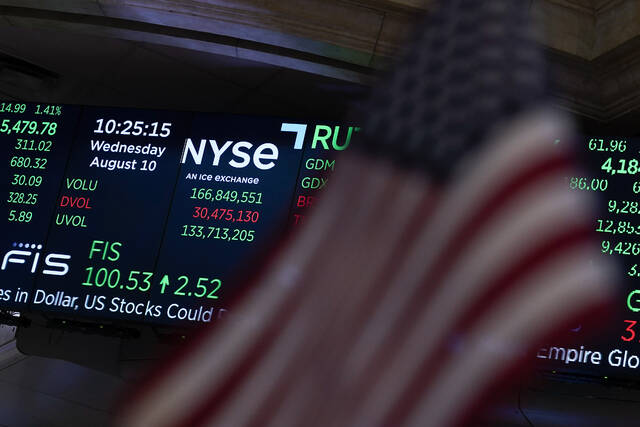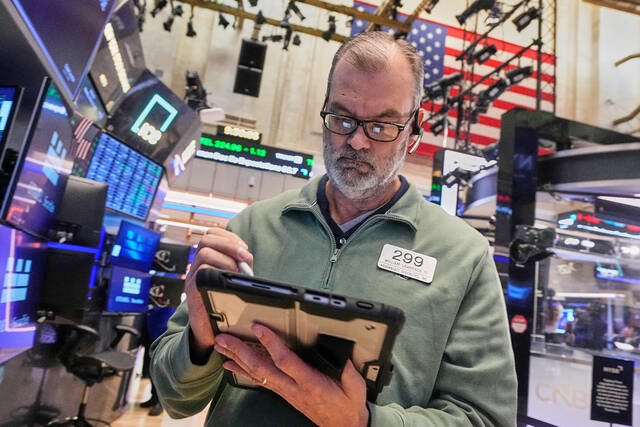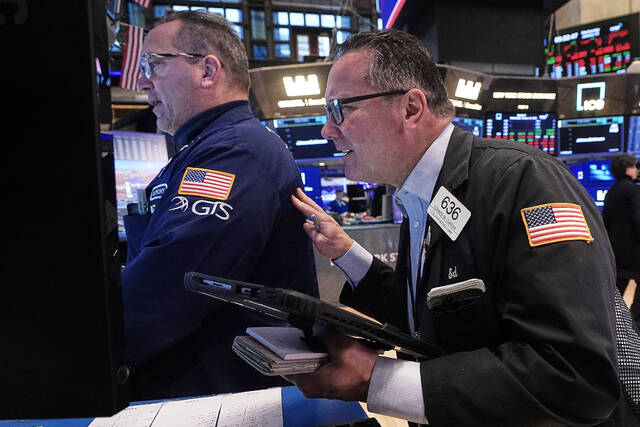NEW YORK — Stocks are climbing Friday and on pace to close out their first weekly gain in the last four.
The S&P 500 was 0.8% higher in midday trading as relaxing yields in the bond market took some pressure off Wall Street. It’s on track for a gain of 1.1% for the week after finding some stability following a swift rise and fall to start the year.
The Dow Jones Industrial Average was up 144 points, or 0.4%, at 33,147, as of 11:15 a.m. Eastern time, while the Nasdaq composite was 1.1% higher.
The central guidepost moving markets recently has been where inflation is heading and what the Federal Reserve will do about it. Early in the year, Wall Street rallied on hopes that cooling inflation would get the Fed to take it easier on its hikes to interest rates. Such increases can drive down inflation by slowing the economy, but they also raise the risk of a recession later on and hurt prices for investments.
Last month, the rally went into reverse after several reports on the economy came in hotter than expected. They included data on the jobs market, consumer spending and inflation itself at multiple levels.
The strong data helped wipe away fears that a recession may hit imminently, but it also raised concerns about continued upward pressure on inflation. That’s forced Wall Street to abandon hopes for rate cuts this year and raise its expectations for how high rates would go.
Such expectations helped send yields in the bond market shooting higher in February, and the yield on the 10-year Treasury has hit its highest level since November. It pulled back Friday, letting off some of the pressure. It fell back to 4.01% from 4.06% late Thursday.
Reports on the economy Friday were mixed. Growth for services industries last month was a touch stronger than economists expected. That’s a good sign for the economy, particularly when manufacturing has been struggling. But it also could add upward pressure on inflation.
Underneath the surface of the report, though, were some encouraging bits for inflation. Growth in prices paid by services organizations decelerated in February.
The next move by the Fed on interest rates is scheduled for later this month. Before then, reports on the strength of the job market and on inflation will likely have big impacts on the market and expectations for what the Fed will do.
Last month, it dialed down the size of its rate increases and highlighted progress being made in the battle to get inflation lower. It also suggested just two more increases to rates may be on the way. But the strong reports since then have raised worries that the Fed could not only hike at least three more times but also could dial back up the size of the increases.
All the worries have come while expectations for corporate profits have been swinging lower. Still-high inflation and rates are eating into earnings for big companies. Retailers in particular have been saying they see some of their customers struggling.
Costco Wholesale on Friday reported stronger profit for its latest quarter than expected, but its revenue fell short of forecasts. Its stock fell 3.3%.
Silvergate Capital, a bank for crypto and fintech companies, fell another 4.8% after more than halving the day before. Crypto companies have been cutting off business with the bank, which warned earlier this week that it won’t be able to file its annual report with regulators in time and that it could be “less than well-capitalized.”
On the winning side was Cooper Cos., a medical device maker that reported stronger profit and revenue than Wall Street expected. It climbed 6.1%.
Broadcom gained 4.7% after it also beat expectations for quarterly profit and revenue.
Stock markets abroad were mostly higher.
Stocks in Shanghai added 0.5% a central bank official said China’s vast real estate industry was recovering from a slump triggered by debt controls that led to a wave of defaults by developers, rattling global financial markets.
The Nikkei 225 in Tokyo gained 1.6% after Japan’s unemployment rate edged lower in January.








